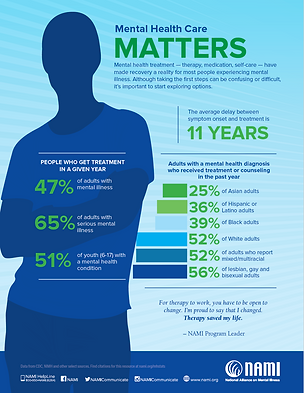
HOWARD UNIVERSITY HOSPITAL
About Mental Health
What is Mental Health
Mental health includes our emotional, psychological, and social well-being. It affects how we think, feel, and act. It also helps determine how we handle stress, relate to others, and make healthy choices.1 Mental health is important at every stage of life, from childhood and adolescence through adulthood.
Mental Health is Important to your Health
Mental and physical health are equally important components of overall health. For example, depression increases the risk for many types of physical health problems, particularly long-lasting conditions like diabetes, heart disease and stroke. Similarly, the presence of chronic conditions can increase the risk for mental illness.
Your Mental Health Can Change Over Time
Yes, it’s important to remember that a person’s mental health can change over time, depending on many factors. When the demands placed on a person exceed their resources and coping abilities, their mental health could be impacted. For example, if someone is working long hours, caring for a relative, or experiencing economic hardship, they may experience poor mental health.
Causes of Mental Illness
There is no single cause for mental illness. A number of factors can contribute to risk for mental illness, such as:
-
Adverse Childhood Experiences, such as trauma or a history of abuse (for example, child abuse, sexual assault, witnessing violence, etc.)
-
Experiences related to other ongoing (chronic) medical conditions, such as a traumatic brain injury, cancer, or diabetes
-
Biological factors or chemical imbalances in the brain
-
Use of alcohol or drugs
-
Having feelings of loneliness or isolation
HOWARD UNIVERSITY HOSPITAL
Mental Health Statistics
How Common is Mental Illness
Mental illness is one of the most common health conditions in the United States:
-
Over 1 in 5 youth ages 13-18 either currently or at some point during their lives, have had a serious debilitating mental illness
-
About 1 in 25 U.S. adults live with a serious mental illness, such as schizophrenia, bipolar disorder or major depression
-
Suicide is the second leading cause of death for individuals between the ages of 10 and 14 years of age


Mental Illness in Washington, D.C.
Mental illness is one of the most common health conditions in Washington, D.C.:
-
One in 5 D.C. residents will experience a mental health illness in their lifetime.
-
In 2023, suicide was the second leading cause of death among adolescents (ages 12-17)
-
Opioids use continue to be the primary driver of increases in drug overdose deaths in D.C.
-
Around 63.6 per 100,000 D.C. residents have overdosed, twice the national average
-
More than 30.7 percent of D.C. residents report symptoms of anxiety


HOWARD UNIVERSITY HOSPITAL
HUH Mental Health Fair
Howard University Hospital Front Pavilion
Wednesday, May 29th; 10:00 a.m. - 2:00 p.m.
May is Mental Health Awareness Month. And each year, Howard University Hospital (HUH) joins the national movement to raise awareness about mental health to fight stigma, provide support, educate the public and advocate for policies that support the millions of people in the U.S., affected by this illness.
On Wednesday, May 29, at 10:00 a.m., the HU Department of Psychiatry and Behavioral Sciences will host a mental health fair on the HUH front pavilion. The event will feature health screenings and resources, giveaways and music for the entire community.

HOWARD UNIVERSITY HOSPITAL
Mental Health Resources



